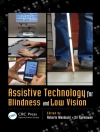Paralleling emerging trends in cyber-health technology, concerns are mounting about racial, ethnic, disparities in health care utilization and outcomes. e Health Solutions for Health Care Disparities brings these currents together, challenging readers to use, promote, and develop new technology-based methods for closing these gaps. Edited by a leading urban health advocate and featuring 16 expert contributors, the book examines cyber-strategies with the greatest potential toward effective, equitable care, improved service delivery and better health outcomes for all.
Chapters go well beyond the possibilities of the Electronic Medical Record to discuss emerging roles for information technology in promoting healthful behavior changes (e.g., nutrition, weight loss, smoking cessation), disease prevention (e.g., cancer, HIV), and healthcare utilization, patient education and medicine compliance). The rise of e-Patients and the transformation of the doctor-patient relationship are also discussed. Opportunities for Web based products and interventions are explored in terms of tracking disparities, improving healthcare utilization and health outcomes, reducing disparities and monitoring trends among patients, whether they have Internet capabilities or not.
विषयसूची
Section I.- An Overview of Healthcare Disparities.- Provider Factors in Healthcare Disparities.- Patient Factors in Healthcare Disparities.- Healthcare System Factors in Healthcare Disparities.- The Social “Nonmedical” Determinants of Health.- Section II.- The Role of the Internet in American Life.- The i Health Revolution.- Digital Disparities.- Section III.- The Role of e Health in Patient Engagement and Quality Improvement.- Medical Informatics.- Public Health Informatics.- Section IV.- Beyond Traditional Paradigms in Disparities Research.- Health Information Technology Policy Perspectives and Healthcare Disparities.- Disparities and e Health: Achieving the Promise and the Potential.
लेखक के बारे में
Michael Christopher Gibbons is Associate Director of the Johns Hopkins Urban Health Institute and Assistant Professor of the Johns Hopkins Bloomberg School of Public Health. He was recently elected President of the International Society for Urban Health.
One of Gibbons’s research interests is the development of effective health interventions to reduce health disparities. He is the founding director of the Center for Community Health Education, Advocacy and Leadership Training at Hopkins (HEALTH), is a member of the Hopkins Center for Health Disparities Solutions, and was named a Health Disparities Scholar by the National Center for Minority Health and Health Disparities at the National Institutes of Health.












